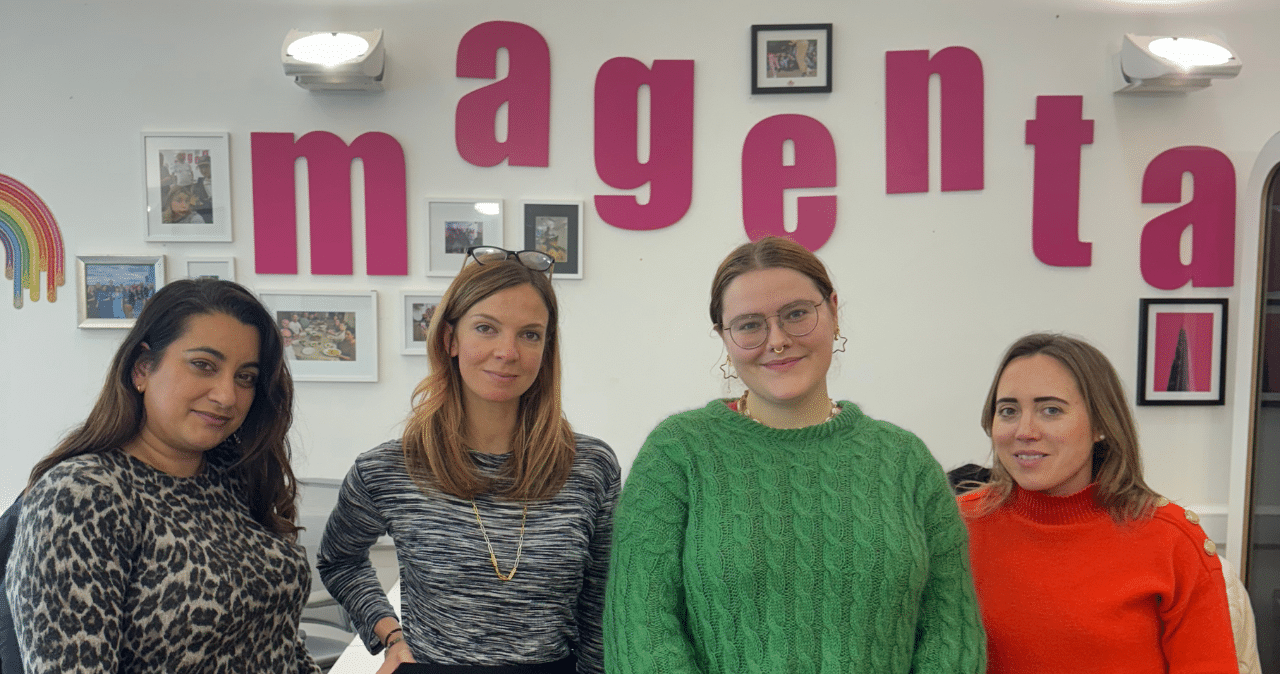International Women’s Day (IWD) has been celebrated in various forms for over a for over a century, commemorating the achievements of women, advocating for their fair treatment, and reflecting on the history of women’s activism.
At Magenta, we want to celebrate the women in our company and industry. We are a woman-founded and led company, and so we asked our colleagues what what IWD means to them.
We spoke with Jo Sutherland – managing director, Shahlia Nelson Rogers – client director, Sabrina Stubbs – senior consultant, and Eve Dickie – executive.
Pictured above, from left to right: Shahlia Nelson Rogers, Jo Sutherland, Eve Dickie and Sabrina Stubbs.
1. Why do we need balanced workplaces?
Jo: Diversity of thought is better for a business – so your leadership team needs to reflect that diversity. I believe that you need female role models in your business to make it thrive, so if you need to set a quota, set one!
To meet those quotas, you’ve got to create big waves. Work with schools and colleges, not just universities, to share stories of women, by women, about the communications industry and the sectors you work within. It’s also why you need diversity champions within your business that create a support network for underrepresented groups, like mentorship opportunities that help people feel heard, seen, respected, and valued.
Shahlia: There is plenty of research conducted that shows why a gender balance is beneficial to business – it has a positive impact on wellbeing, job satisfaction, even growth and profitability. It seems crazy to me that we must highlight why it’s a good thing for business though.
You would think that in 2024, businesses wouldn’t need to be given a reason to not discriminate against half the population. Good businesses are taking action to make inequalities in the workplace a thing of the past – it’s time for the rest to catch up.
Sabrina: We can’t create diverse, well-rounded workplaces if they are led by one particular group of people. Collaboration is key to creating workplaces everyone can love. A broader mix of people generate fresh ideas and create new opportunities. Everyone should have a voice.
Eve: Businesses cannot function properly if their leadership refuses to understand key stakeholders within their work, and their impact on the world. Businesses like sanitary product developers come to mind, where products only advanced once working women were able to give their input. We bring our own perspectives to the world, which is of course beneficial and quite frankly, fundamental.
2. As a woman, have you had any experiences at work that men typically would not?
Jo: A couple of incidents come to mind. The first was years ago when a client assumed that I wasn’t the right person to present a PR and marketing strategy I’d developed to a board because I was young, blonde, and had an Essex accent. A male colleague was asked to present instead because I presumably wouldn’t be “liked”.
Luckily, my colleague supported me, and I was still pushed to present. I was eventually chosen by the client, though begrudgingly. I also think it’s important to note that this particular client was a woman – these challenges and assumptions are not only made by men. The board was not only happy with the strategy, but they loved me too.
I’ve also been called ‘sweetie’ in a meeting. I think that’s indicative of the disrespect men don’t typically see in professional settings – I’ve not witnessed a man be called a pet name in the office.
Eve: I appreciate that at Magenta I can be honest with my health and wellbeing, and that there are support structures in place. That’s not something I’d experienced before.
Maybe that isn’t just a gendered issue because everyone should be able to express themselves, but it’s refreshing to be in a woman-led business that listens to its employee needs. That includes having sanitary products supplied in the toilet. It’s a small thing, but it’s treated like any other necessary office supply. It makes me feel like my needs are met, and I think that should be more commonplace in workplaces.
3. Do you have any advice for women wanting to enter the PR and communications industry?
Jo: Firstly, I’d say it’s OK to be human. Make meaningful connections and treat those connections with the respect you’d like to be met with. Always ask questions and don’t be afraid to go against the grain. Knowledge is power, and you should always be hungry to know more.
Shahlia: Comms roles can be hugely varied. You need a range of skills and interests – everything from stellar copywriting and attention to detail, to a hunger for learning and the ability to build relationships.
Key to all those things is confidence and resilience – you’re going to get knocked back, you’re going to be told “no” – and you need to be able to keep going.
Sabrina: The PR and communications industry is so diverse. Not only do you learn the communications skill set but you also learn about lots of different sectors and business operations. It’s great for the curious mind!
Eve: This is my first role in PR, and I’ve learned so much about client relationships, juggling different deadlines, press outreach and writing in an adaptable voice. PR lets you work with a huge range of people and there’s so much to learn.
Want to hear more from us at Magenta? Read more of our blogs, or contact us today.








